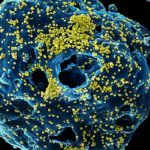Diabetes, a disease commonly affecting over 100 million adults in the U.S., as of 2018, is often correlated with an increased risk for nicotine addiction. Due to its prevalence, new research, funded by the National Institutes of Health, has turned to a diabetes-associated gene known as transcription factor 7-like 2 (Tcf7l2) for any correlation between diabetes and nicotine consumption. The findings appeared in Nature.
According to Paul Kenny, the study’s lead author, Tcf7l2 plays a vital part in the regulation of how the brain responds to nicotine. By examining the medial habenula (mHb) region of the brain in rodents, researchers established how preventing Tcf7l2 signaling in this region of the brain could result in higher intake of nicotine.
As detailed in the findings, Kenny writes: “Here we show that the diabetes-associated gene Tcf7l2 is densely expressed in the medial habenula (mHb) region of the rodent brain, where it regulates the function of nicotinic acetylcholine receptors. Nicotine increases levels of blood glucose by TCF7L2-dependent stimulation of the mHb.”
The correlation between the diabetes-associated gene and nicotine addiction originated by genetically eliminating Tcf7l2 in rodents. During the experiments, researchers noticed an increase in the consumption of nicotine at each dose among the mutant rodents. Upon observing an increase in nicotine consumption while a loss of Tcf7l2 function occurred in the mHb region, they noticed a decrease in blood glucose associated with nicotine use, which subsequently prohibited any abnormal changes in glucose levels linked to diabetes.
“Our findings suggest that TCF7L2 regulates the stimulatory actions of nicotine on a habenula–pancreas axis that links the addictive properties of nicotine to its diabetes-promoting actions,” states Kenny.
Nora Volkow, Director of NIDA, added: “Although addiction is a brain disease, this discovery underscores how the body’s complex functions are exquisitely interconnected, revealing the need for integrated and innovative research.”


